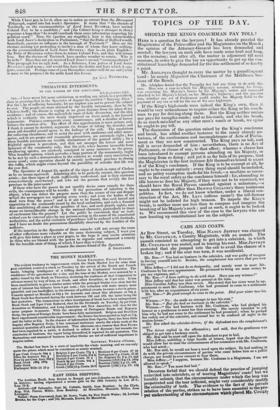TOPICS OF THE DAY.
SHOULD THE KING'S COACHMAN PAY TOLL?
HERE is a question for the lawyers ! It has already puzzled the Magistrates of the Police-office and the Magistrates on the Bench ;
the opinion of the Attorney-General has been demanded and
mooted; the lawyers on each side have made noise loud and long, on the occasion; and after all, the matter is adjourned till next sessions, in order to give the bar an opportunity to get up the con
stitutional knowledge demanded for the due settlement of so knotty a point.
Mr. ADOLPH US thought to carry the matter by a grandiloquent word : he nearly Majestied the Chairman of the Middlesex Sessions off the Bench.
Mr. Adolphus denied that the Turnpike Act had any thing to do with this case. Here was a case in which his Majesty's servant, wearing his livery, was exercising his Majesty's horses by his Majesty's orders and command attached to his Majesty's break, on his Majesty's highway and 'the question was, whether any act of Parliament could render his 2liajesty liable to the payment of any tax or toll for the use of his own highways.
If the King's high-roads were indeed the King's own, then it would be very unhandsome to require either the King or his coachman to pay for driving along them. But the King neither makes nor pays for turnpike-roads; and as his coach, and eke his break, do as much mischief as any other man's coach or break, we opine he ought to pay toll.
The discussion of the question raised by the King's coachman and break, has added another instance to the many already notorious, of the carelessness and incompleteness of Acts of Parliament as they are now constructed. The King pays no toll, and toll is never demanded of him : nevertheless, there is no Act of Parliament, or clause of any, to that effect; whereas a clause has been introduced to exempt persons attending on his Majesty, or returning from so doing; and yet it so far fails of its purpose, that the Magistrates in the first instance felt themselves bound to exact it of the King's coachman. If the King is to be exempt at all, he ought to be exempt entirely : every thing royal should be included, and no paltry exemption made for his break,—a machine as necessary to the royal safety as the coachman himself: for, abounding in idle horses as does his Majesty, if they were not to be exercise, we Should have the Royal Person smashed against a milestone;--a much more serious affair than DENNIS Couarrs's three traitorous pebbles. In fact, we do not know whether, under a liberal construction of the Act, Mr. LEVI (odious name!) the toll-farmer might not be indicted for high treason. To impede the King's break, is neither more nor less than to compass and imagine the breaking of his Majesty's neck ; and as such, it ought to be looked to. We recommend this view of the case to the lawyers who are now hunting up constitutional law on the subject.


























 Previous page
Previous page